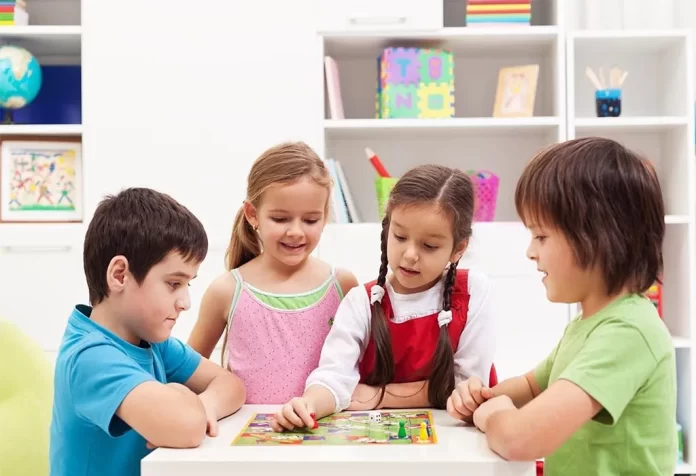Aside from the competitive nature of board games, they also offer family bonding time. This is especially beneficial for kids who are shy or have communication difficulties.
Board games can help kids develop logical reasoning, number sense, and creative thinking skills. These skills are essential for all types of learning, no matter what field kids choose to pursue professionally down the road.
Navigate
Cognitive Development
As kids age, board games that require logical thinking and strategic planning can help them develop these skills. ‘They also have the opportunity to practice self-control and to learn to be more patient when waiting for their turn, and can begin to think from others’ perspectives,’ says Ellie.
Many fun learning games also promote creative thinking, an often overlooked skill. Creative games allow kids to compare two unrelated concepts and develop original ideas. These right-brain activities engage the brain’s creative center, which is dominant in preschoolers and children up to age nine.
Critical thinking is an important skill that a book can’t teach. Kids need to think critically and strategically to win board games. Kids also need to be able to plan several steps, form abstract thoughts and make decisions quickly, which can help them in life. A few studies have found that kids who play these types of board games have better problem-solving skills.
Social Skills
Board games allow kids to practice social-emotional skills, including cooperation, communication, and empathy. This is one reason why groups that help children with emotional challenges often incorporate board games into their therapeutic programs.
Kids develop their concentration skills when playing board games – they must switch off distractions and concentrate on the game. They also learn to listen and follow instructions, which are key to learning and life. For example, when playing, kids must listen to the rules and instructions on how to play the game. They also have to manage their money and make decisions about financial planning – a real-life skill that will serve them well later in life.
Some board games are designed to be educational or teach specific curriculum areas. These educational games can get kids’ brains buzzing! They are great for kids of all ages and help encourage literacy and numeracy development, as well as helping to build critical thinking and problem-solving skills.
Hand-Eye Coordination
Children start developing hand-eye coordination from a very early age when they play with toys such as balls, pouring water into cups in the bath, playing with stacking blocks, or trying to fit wooden puzzle pieces together. By the time they are two or three years old, many children will be ready to start throwing and catching a ball, which is an excellent way to build this skill.
Most board games involve logical, systematic thinking and working, as well as quick decision-making and strategizing. This is important for children to learn and develop. If a child can be taught to think and solve problems independently, they will do better at school and later in life when they move into the work world.
Several educational board games have been designed for specific areas of the curriculum, such as science or history, and these can be a great way to reinforce what a child is learning in school. However, it is important to find a game that is age appropriate for your child’s cognitive development as well as their attention span.
Problem-Solving Skills
Many board games require a lot of strategic thinking to win. This helps improve logical reasoning skills and deductive thinking for kids. It also teaches them to think outside of the box. Creativity is another skill that board games promote.
Playing board games also teaches mathematical thinking. For instance, dice-based games teach addition concepts and one-to-one correspondence (counting). Other games, such as chess, teach strategy and problem-solving, while other games teach money-management skills. Studies have shown that kids who play chess regularly do better on math tests than those who don’t.
Moreover, some board games are great for developing spelling and vocabulary skills. Word games encourage children to build their word bank. At the same time, puzzle games help them develop their visual thinking skills. Moreover, some board games require teamwork which builds social skills.
Fine Motor Skills
Kids who use fine motor skills, like writing, typing, or sewing, benefit from the talent and visual and perceptual stimulation of playing board games. Developing these skills helps them perform well in other academic subjects, such as math and reading.
Board games also encourage kids to practice social skills, such as taking turns and learning to win or lose gracefully. These skills will help them as they grow into interacting with peers in other settings outside of family game night, such as on playgrounds or during school activities.
While some parents may write off board games as boring, old-fashioned, or time-consuming, getting the kids away from their devices and sitting down to a game can benefit everyone. Plus, it can be a great way for children to strengthen their abstract language skills, often delayed in neurodivergent kids, while still having fun.









![PDF Extra MOD Apk Download Latest Version for Android & PC [2022] PDF Extra MOD Apk](https://androclue.com/wp-content/uploads/2022/05/PDF-Extra-MOD-Apk-100x70.jpg)
